2022 Year in Review
Whew! 2022 was a big year for the game. We worked on it almost the whole year through and got a LOT of stuff done. The game looks very different now than it did at the start of the year, both visually and in terms of gameplay and mechanics. To celebrate the progress we've made, this is a review of everything we added to the game this year and our thoughts on it.
End of 2021
First let's talk about what the game used to look like back in 2021.
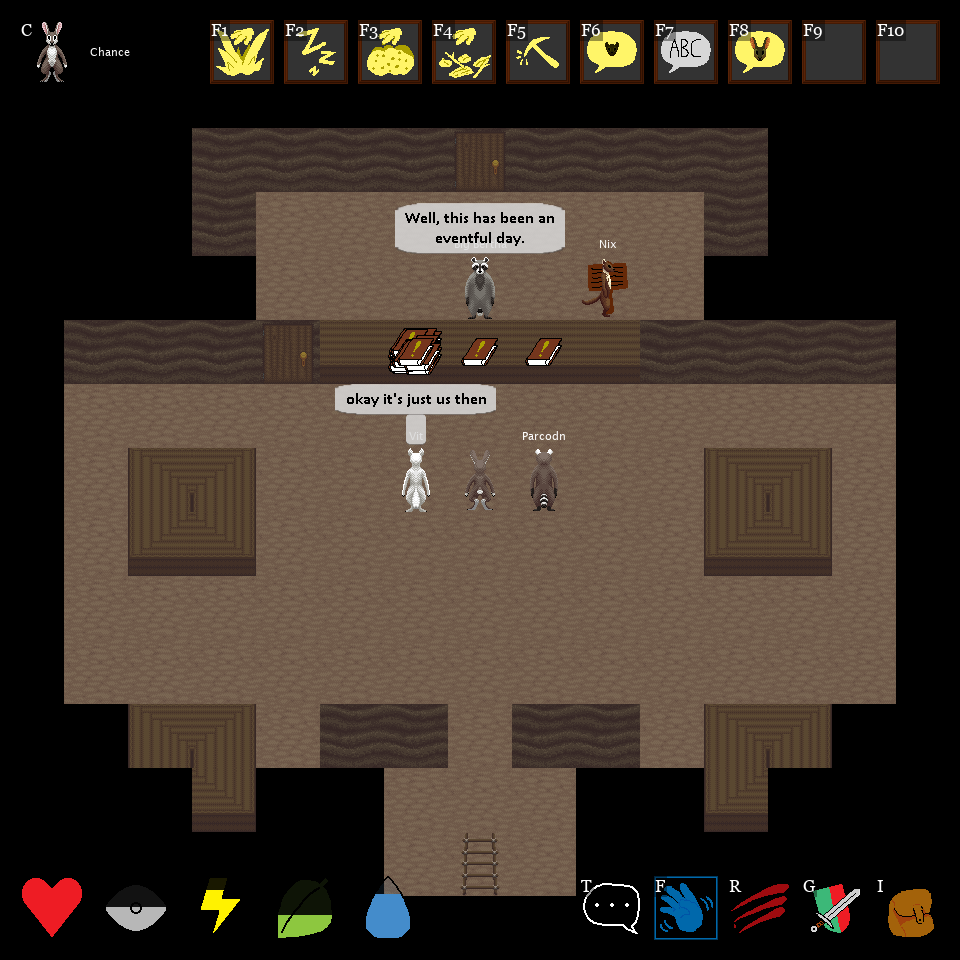
As you can see, some things changed, some things stayed the same. Burrows are far more empty than they typically are now, since no furniture beyond signs existed yet. Items are still using placeholder programmer art; nowadays people take Pica's gorgeous sprites for granted. Most of the character sprites were later remade (never forget Power Stance Rabbit). The core of the game is there and recognizable, but it would be a very different game by the end of the year.

No lampposts, just fire crystals, but this section of the Deepwoods is still more or less recognizable. Character sprites are still centered in the tile at this point. Ah, the halcyon days! Everything was so simple then. Too simple. The screenshots above were contributed by players at the time, otherwise we might not have snapshots of the game from that time period. Remember that when you're playing an early access game! Take and share screenshots, so that you can appreciate how things change over time.
Some of the things we rolled out just before the new year in 2021:
- Bowls and baking pans. Yes, bowls didn't exist at the time of that first screenshot. There was no stew and no salad. Just bread and pies!
- Saving the message backlog to your disk. Before then, if you logged out, all your chat history was simply gone! Your character's memory was your memory, and conversations from two weeks ago were easily forgotten.
- A HUD indicator for being hidden, since it was pretty difficult to tell when you were hiding otherwise.
- The Mindtrap spell. Bane of purple mages!
- Consent prompts for Summon and Teleport. You used to be able to force-summon people quite easily and abruptly; this change made it harder to summon people unwillingly, and allowed them to say goodbye and tidy up their affairs before they left.
January
At the start of the new year we rebalanced the Mundane trait due to the proliferation of jewelry and enchanted equipment. Previously the trait was worth only -2 trait points, and the effects of casting on a Mundane character could be pretty much ignored by any sufficiently trained caster. We judged the effects of being Mundane to be far more debilitating to a character in the long run (I mean, you're forfeiting quite a lot of stat boosts in jewelry, for... +2 to a stat?), and changed it to a -8 trait, as well as making it so that casters of every level needed to stay on their toes around Mundane characters.
We also started the first of a lot of map expansion. Tully Pass used to be closed at the end; we opened it up and added the Torrus Foothills as well as Torrus Peak and Aureas, moving gold and iron mining out of the pass. That's right; the entirety of the map used to stop at Tully Pass. Just 13 zones! It was pretty hard to hide from anybody in those days.
January was also the month we built the forum on our website. It was important to us that the forum be integrated with the game and allow people to discuss things on specific characters, because having the choice to separate player from character is an important part of the game. If you can't post as a character, you have to reveal which characters you play! With the forum you're able to log in as any character and post as them.
And I believe at some point this month we implemented proper sprites for all the items in the game, since we were getting a spotlight on r/MMORPG that month and wanted the game to look a bit more presentable in the screenshots. Here's some of the sprites as we were making them:
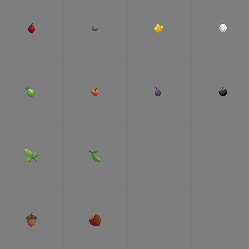
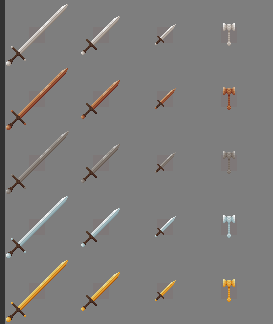
February
The inventory screen is a pretty important part of Farwoods. Since all of the UI is (currently) overlapping the play area, and the camera stops panning at the edge of zones, it was pretty inconvenient inside burrows that the last three tiles on the right side of your screen were overlapped by your inventory. Since it was very difficult to place anything on counters there, players were in the habit of not putting any closets or tables on the rightmost side of a burrow, or just not using that space at all to ensure that your inventory didn't overlap anything. We fixed this by making it so that when you drag an item, the inventory screen turns transparent, allowing you to see countertops underneath it and place things there.
We also did a lot of balancing around mining and gems in late 2021/early 2022. Mining used to be ridiculously easy, so people had vast piles of iron, gold, and gems. Part of the philosophy behind Farwoods game balance is "materials in -> materials out," so we needed to make sure that these metals left the economy eventually. But if you were a really good green mage, you were never going to fail your Empower cast and destroy the gem, so it'd never need to be replaced. We resolved this at the time by making it so that the Empower spell and the crafting recipes for making jewelry had minimum failure chances, and you'd always have a chance to fail. The green mage would eventually break the gem in the ring, and the jeweler might break the ring and gem trying to put them back together. Thus, you have a need for more gold and more gems.
We also rebalanced movement speeds for the first time. There weren't previously any caps on walking speed, so you could make a character that walked faster than most other characters ran, if you min-maxed them, and then zoom around the map. We added diminishing returns for walking and running so that walking would always be slower than running, except maybe compared to the very slowest characters.
It also used to be a problem that you could easily bodyblock players. It made it rather easy to troll, since you could trap people in nooks and crannies in the map, or wall off chokepoints so that people couldn't get by. So we added pushing, tied to the running key, to allow you to shove other characters around. We later used this to push a Valve employee who was AFK while testing the game for approval out of the Library and summon them to a remote part of the map to surround them with our alts. Fun times!
Oh yeah, and the players immediately figured out how to use it to noclip. In a two-dimensional game!
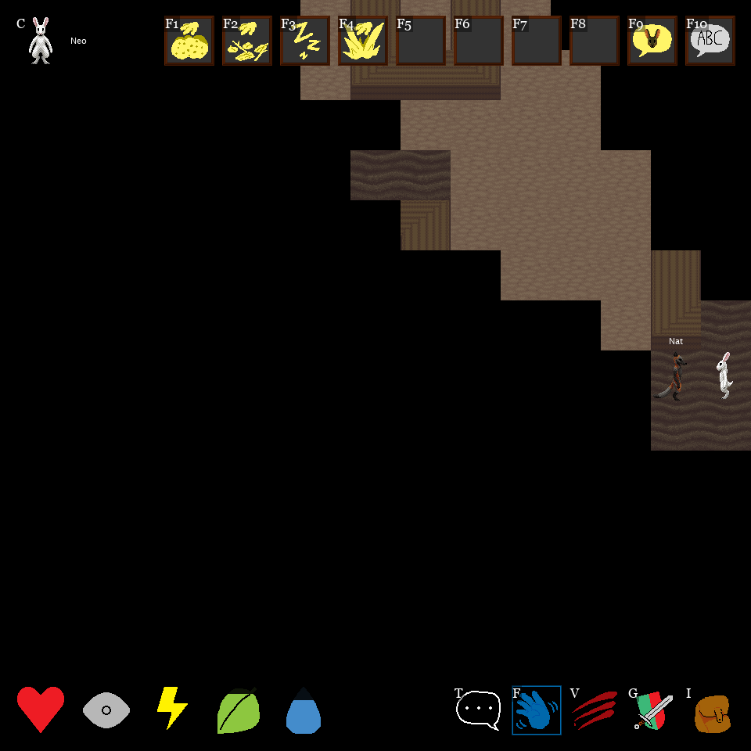
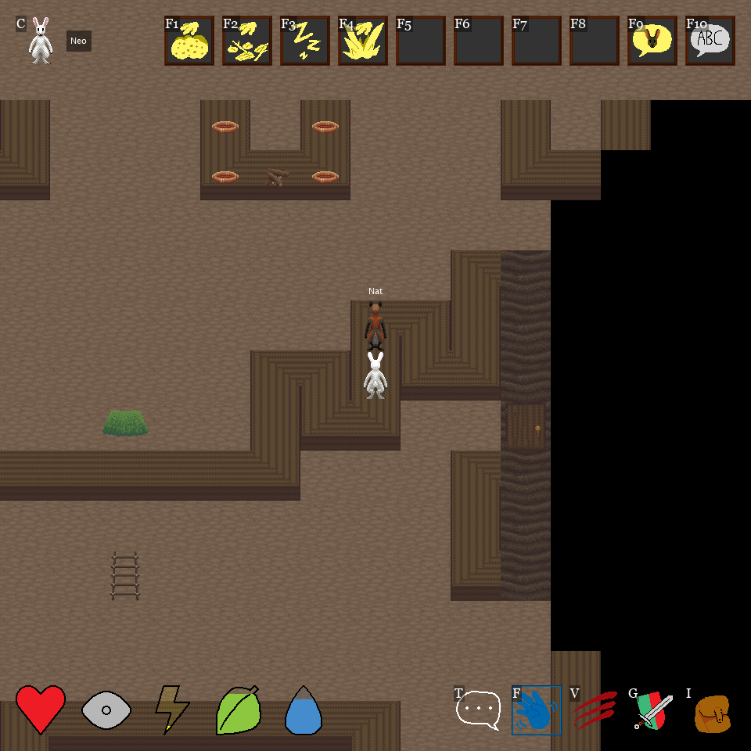
Obviously the ability to clip through solid objects into burrows was incredibly exploitable, and could have been used to steal things, so we fixed it right away. But it was quite funny.
A few days later we added axes and spears, changing the Staves skill to Polearms to encompass both staves and spears. Axeheads, arrowheads, and spearheads needed to be forged by weaponsmiths, and then a wood armorer would attach them to a shaft. We also added string requirements to making weapons; there were very few uses for string in those days, to the point that players even asked for a way to turn it into cloth. In the same day we made life a lot easier on deceitful characters, by making Hiding, Disguise, and Impersonation persistent across logins, so if you were disconnected for any reason it wouldn't reveal you when you logged back in.
We also added some protections for looting; pickpocketing could no longer be spammed on an unwary target to empty their inventory, because it applied a stacking temporary skill penalty each time you did it. And looting a character would add to their temporary invincibility when they stood back up, giving them time to get away before they could be attacked again.
A few days later we made some changes with combat in mind: a new Tanglecloth Padding item used for making armor, to give tailors something to produce when everybody already had clothing. And combat utility skills (Bash, Kicking, Tail Sweep, etc.) became less effective against other characters who were good at them, e.g. Bash against strong characters. We also made being stunned reset your attack cooldown so that there was some disadvantage to stunning people repeatedly; do it too often and they'll be able to get in more attacks. Plus, a 2-second cooldown on looting a character when they are knocked out, so that you don't do it accidentally while spamming attacks.
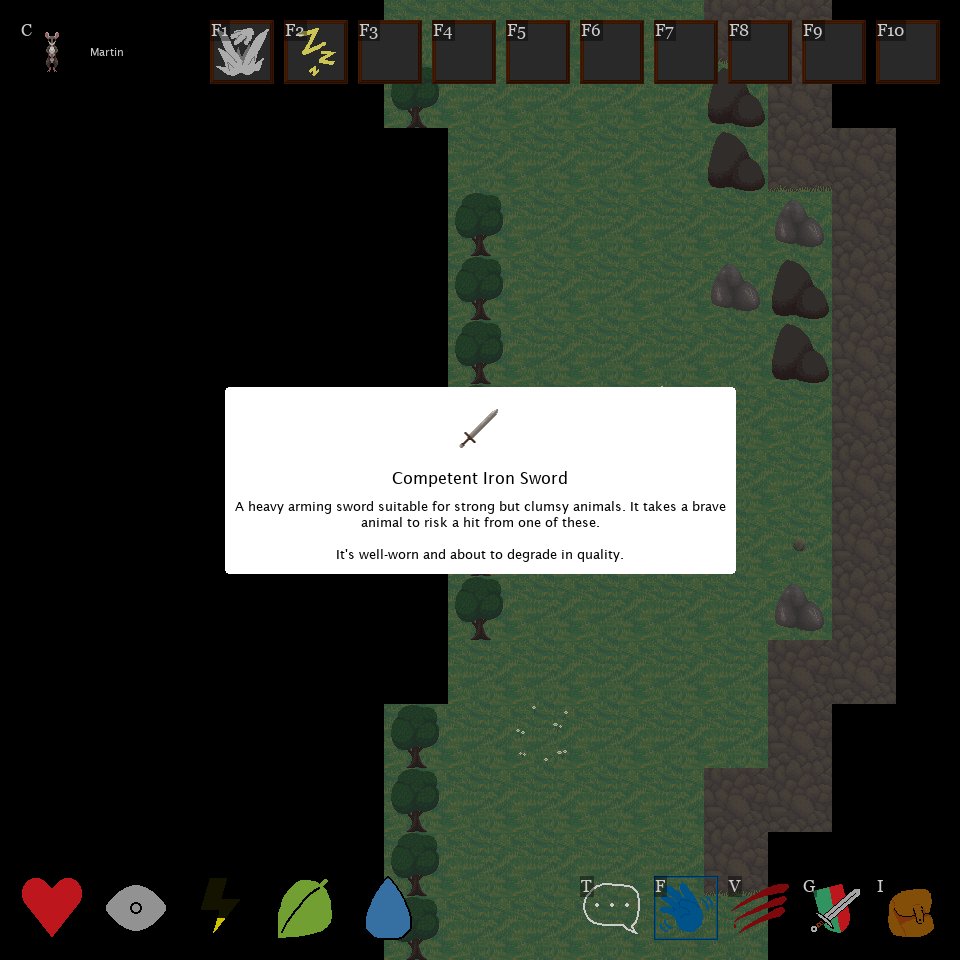
It was also noteworthy that combat magic was incredibly powerful compared to physical attacks since you could dish out your entire Mind pool's worth of damage in the span of a single sword-swing. So we added cooldowns to combat-useful spells as well, not just Lightning Bolt but also spells like Invigorate that have combat utility.
We also tackled item qualities. Previously, if you were a highly-skilled craftscritter, you could churn out high-quality items all day long. We added some hard limits to item qualities above Competent; if you rolled to craft one, it would have a chance to be reduced to the quality below it, and so on, so that highly-skilled crafters would mostly produce Competent items but occasionally better ones. This was only our first pass at this, and we would tackle it again later, but it at least reduced the proliferation of Flawless equipment.
Finally, aside from a bunch of other balance changes and bugfixes, we wanted to make Writing (née Literacy) a useful and powerful skill. Therefore, we created a mechanic by which scribe characters, rather than crafting skillbooks of their own skills, could prompt other players to provide their skills and transcribe skillbooks from them. This way one scribe can make a skillbook of any skill, provided they have someone trained in that skill. Important, for the scrounging nerfs to come that would make skillbooks rarer!
March
One of the problems we noticed was the fact that people with enough time on their hands could sit around in the best spots for scrounging and just mash the scrounging button to fill up their inventories with food and materials. This was also a problem with Mining which we tried a bunch of different things to address, neither of which would be properly fixed until much later in the year, but we did a pass at rebalancing it by making it so that areas could be exhausted of resources, and scroungers would personally have caps on how much they could produce each day.
This at the very least made it so that grinders couldn't flood the economy with infinite resources and destroy any sense of scarcity. If there's no scarcity, there's no story! Stories are about people who want things, not people who have everything and are satisfied. Those would be very boring stories.
We didn't do much else in March, except flesh out our admin tools for moderating the game. The ability to easily edit characters and items allowed us to set up a special event on a separate server, with pre-made characters, to test out the combat system. Players were arranged randomly into two teams to fight each other.
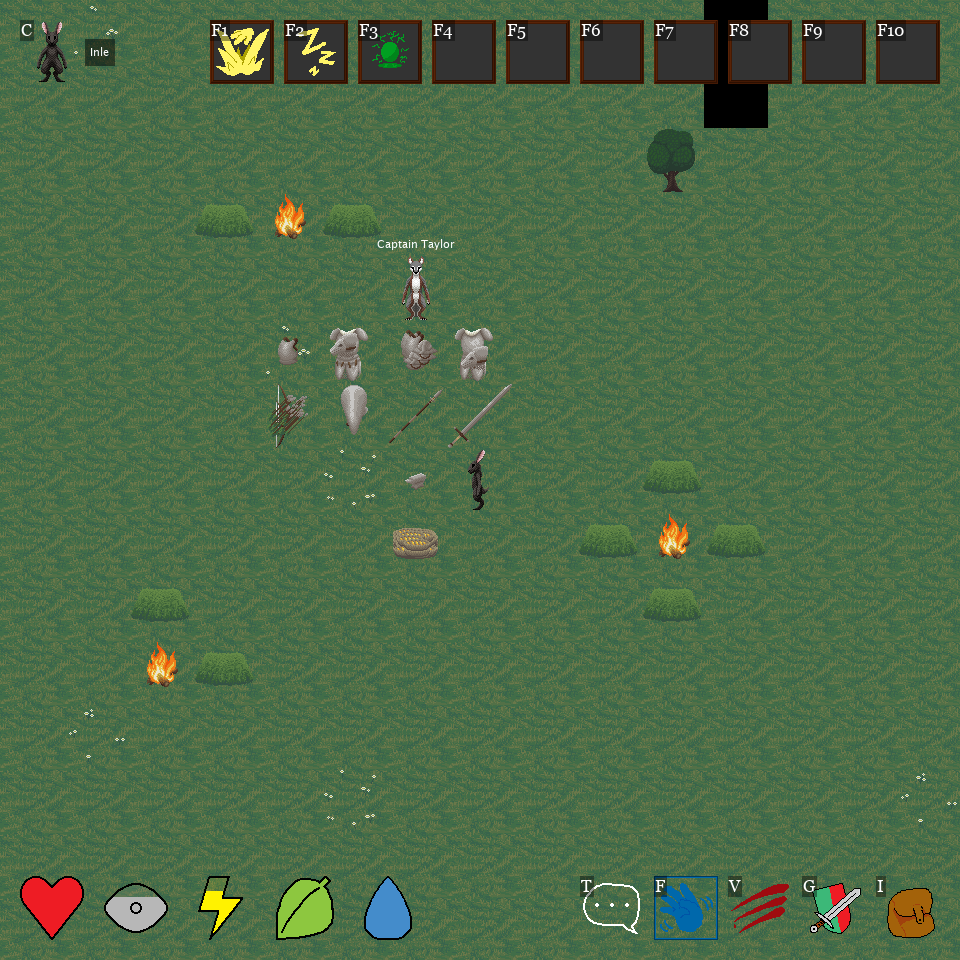
April
The event was arranged at the end of March and then run at the beginning of April. We learned a lot of stuff about combat from it, most notably that armor was way too powerful. Realistically, plate armor should be extremely protective, but it wasn't very satisfying to fight against, especially back then when you would run out of Stamina and be essentially unable to fight anymore until you laid down for a nap. Most duels between armored combatants went to standstills. So we changed armor to absorb a random amount of damage up to its maximum rather than its full amount, keeping it powerful but allowing you to get damage through it.
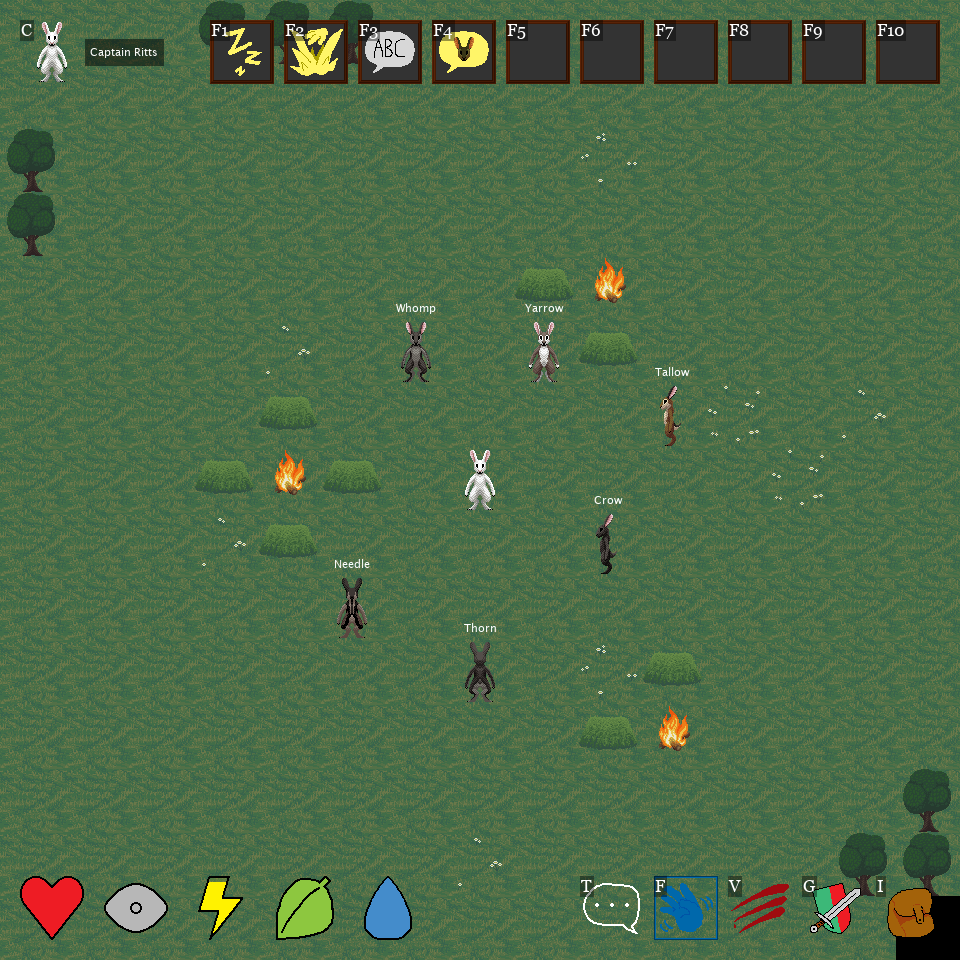
Black magic was also way too powerful in combat, which was never its actual intent; curses were supposed to be things that debilitated you over the long-term, not useful combat spells. So we reworked most of the curses to take effect slowly over time, rather than immediately, making them effectively useless in combat except to spite characters that attacked you. Shields also got a bit of a nerf in that blocking now used 1 Stamina rather than none.
Finally, this month we added a bunch of new spells: Counterspell, Psychic Tether, Stasis, Recall, and Doorbell. Mostly sigil spells, piggybacking off the system put in place by Mindtrap. The most noteworthy is probably Doorbell, which became ubiquitous in shops to alert their owners of the arrival of customers.
May
In mid-May, a big update dropped! We removed leaves from the scrounging pool, and leaf blankets from the crafting recipes. They were broadly worthless, having few crafting applications, and largely just served to pollute the inventories and burrows of habitual scroungers, who never threw anything away. So we grandfathered the existing items in, and replaced the other uses of leaves in crafting (pens and arrows) with feathers.
With this came many new furniture items for Woodworking, which had previously been a fairly useless skill that mostly just produced cups and bowls: stools, beds, and lampposts, as well as rugs, tapestries, and blankets for Tailoring. Beds were the cornerstone of this update, which in addition to adding more stuff to put in burrows and more ways to decorate yourself also revamped the resting system.
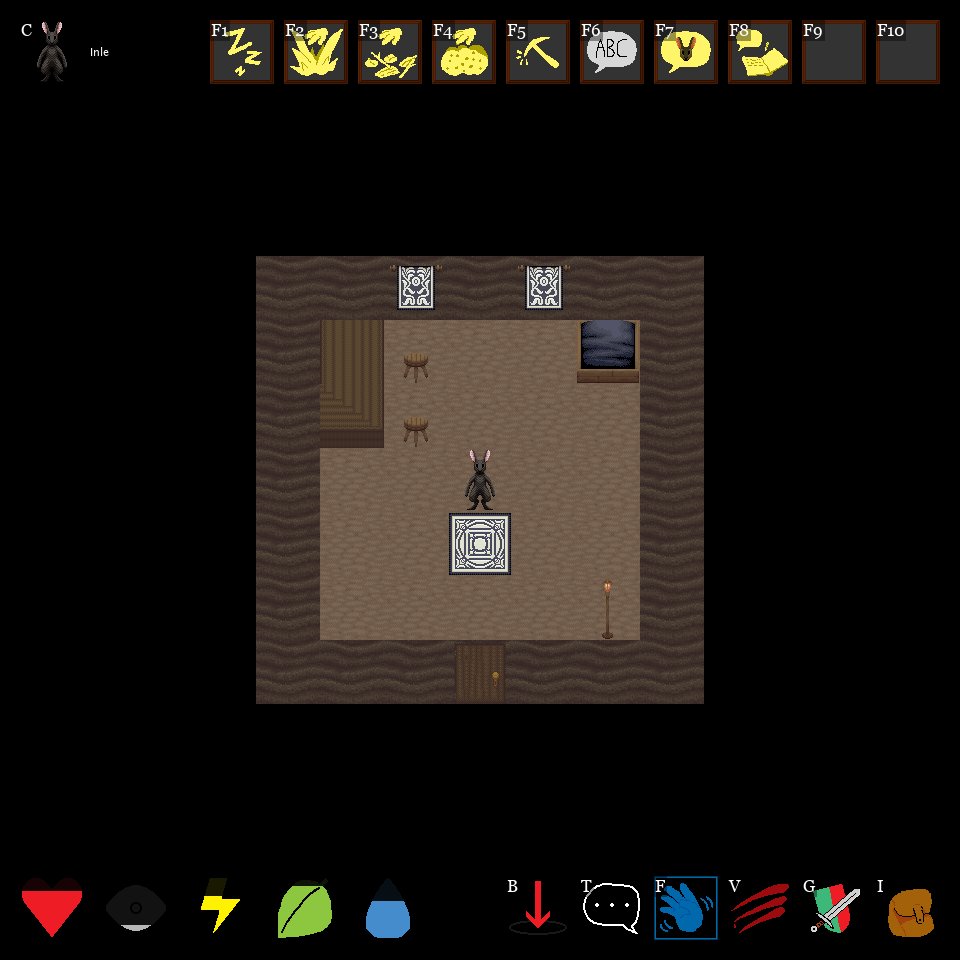
A bedroom on the testing server after the update.
Essentially, rather than having to sleep every time you wanted to quickly regenerate HP, Mind, and Stamina, you could now sleep for a few minutes and gain a Rested effect, depending on where you had slept. If you became Rested while on a bed, you would continue to regenerate while awake and moving around as though you were sleeping on the bed, for several hours. This was also in part a solution to the problems with combat we had witnessed, with most fights coming to stalemates between seasoned combatants, when they ran out of Stamina. Now, they'd continue to regenerate as though they were sleeping, allowing them to keep fighting at a slower pace.
These new items also made burrows feel considerably more cozy. Where before there were barren rooms with counters and tables, and a few signs, there were now banners hanging from the walls, seats at the tables, and proper bedrooms. This was a great first step towards making burrows attractive.
As you may notice, we also added an initial implementation of dyeing. Tailors could choose what color they wanted to make their cloth goods when crafting them, allowing people to wear clothes of varying colors and style rooms after them. Later on dyeing would be moved out of the Tailoring skill, which would also let you re-dye clothing. We had also added new types of inedible berries for ink and wax, though before those items were added they were primarily used for dyeing.
Updates came thick and fast this month, as we prepared for Steam Next Fest in mid-June. The next update a week later added rain and fog, cycles of weather on top of the day and night cycle, naturally with ambience, as well as fully implementing the new rest system.
Additionally, we went back and addressed issues with the jewelry system. It was very easy to get a gold ring with a gem, which would give you +6 to a stat, and gems were still plentiful enough that it was easy to replace, making them essentially worthless. This didn't seem right; gems should be valuable! Therefore we added quality ratings to gems: rather than all rubies being equal, you would have Cracked Rubies, Regular Rubies, and Brilliant Rubies, in order of rarity. Existing gems defaulted to Regular quality, and a Gold Ruby Ring would only give +4 Strength instead of +6 (which now required a Brilliant gem).
This month we also launched our alpha trailer and Steam page! As you can imagine, a lot of stuff in it is pretty outdated by now, but here it is:
It was well-received, and posting it on Reddit got us a lot of attention ahead of Next Fest. Almost immediately though we made it out of date by releasing a major update with a ton of overhauls and new content. The first and most major was skill checks: we standardized skills across the board, making them easier to use at low levels (this was a common complaint), and ensuring they always had a chance of failure at high levels, however small. We also standardized critical failures and degrees of success, replacing the legacy systems for crafting quality and things like hurting yourself trying to climb.
We also added a system of "practicing," wherein in order to advance a skill, you would have to use it (or attempt to use it) a certain number of times which increased as your skill level increased. This wasn't anything particularly onerous; you'd practice once per skill increase as a beginner, and maybe eight or nine times as you approached the skill cap. But it did mean that you couldn't just dump 100 skill points into a skill and become an expert at it anymore. You'd have to actually use it, and get a feel for it as your skill at it increased.
This is an excellent system for a number of reasons. First of all, having to actually use the skill gives a player feedback for how that skill feels at each practice gate along the way. This intuitively allows them to figure out when they're satisfied with their performance in a skill and don't want to spend any more on it. Secondly, it means that characters that master skills actually have some reputation for them. A capable fighter has actually sparred and fought and earned their equipment. A powerful black mage has actually afflicted critters with curses. An expert scrounger has wandered extensively and learned where things can be found. It does limit the ability of characters to come into the game with backstories like being a master smith, or a capable fighter, but it's well worth the tradeoff.
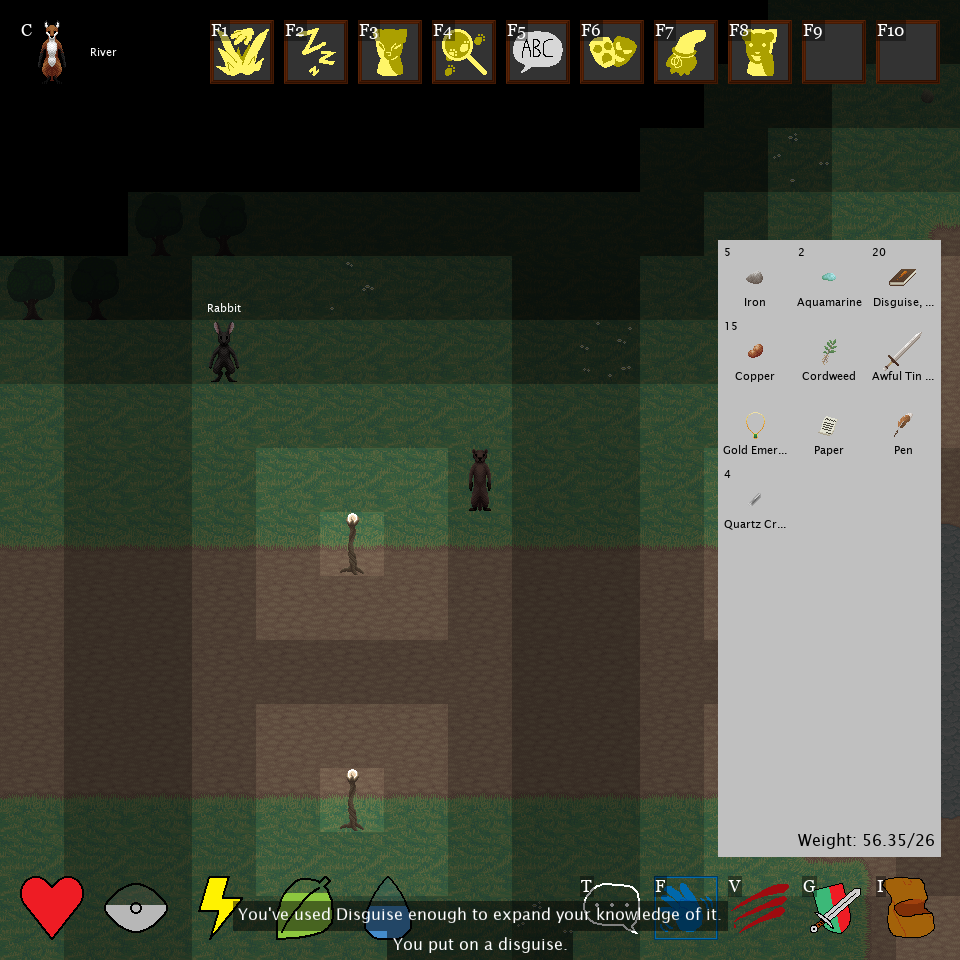
We made Crystal Magic a requirement to learn any color of magic as well, for two reasons. First, practically speaking, it is a requirement, and all mages are going to raise their Crystal Magic as high as possible. Secondly, it adds a "fledgling mage" period to any new mage character, where they are learning the fundamentals of magic with fire crystals, before they ever channel their first quartz. We think that's a really appealing experience.
We also felt that mages reached their full potential far too quickly. It was rather easy to make a self-sufficient mage who could scrounge for quartz, and then use that limitless supply to grind crystal charging until you reached the cap. Magic is supposed to be the hardest system in the game, so we addressed that by splitting quartz into five different types of crystals: fragments, shards, clouded crystals, clear crystals, and prismatic crystals.
Fragments and shards could be found through beach scrounging, as before, but could only be charged up to relatively low levels. Proper-size crystals could only be gotten through mining uncut quartz and having it cut by a jeweler, with similar rarities to gems. All existing crystals became shards and their charge was reduced to the cap, and so mages once again became an interconnected part of the economy reliant on others to achieve their full potential, and the highest-charged prismatic crystals became rare and awe-inspiring once again.
Speaking of Mining, it was adjusted once again to be considerably more dynamic. Rather than, like scrounging, simply pulling available metals from the adjacent tiles, it now checked the ore rocks in a wide surrounding area, allowing us to make rock faces considerably larger and more rocky and mixed in with varying different types of ore that you might find. This made Mining a little more dynamic in that we could make mining spots "better" for different types of metal by controlling how many nodes of that metal were scattered around.
Another major addition was the introduction system. At this stage of the game names were really important for magic reasons, especially on bandit characters, since critters might try to revenge themselves on you by getting a purple mage to summon you somewhere you're vulnerable. But a character's name was always hovering over their head, meaning that doing any banditry essentially guaranteed you'd be running afoul of a purple mage's friend. It was also kind of hard to keep track of who you had met and whose name you should know.
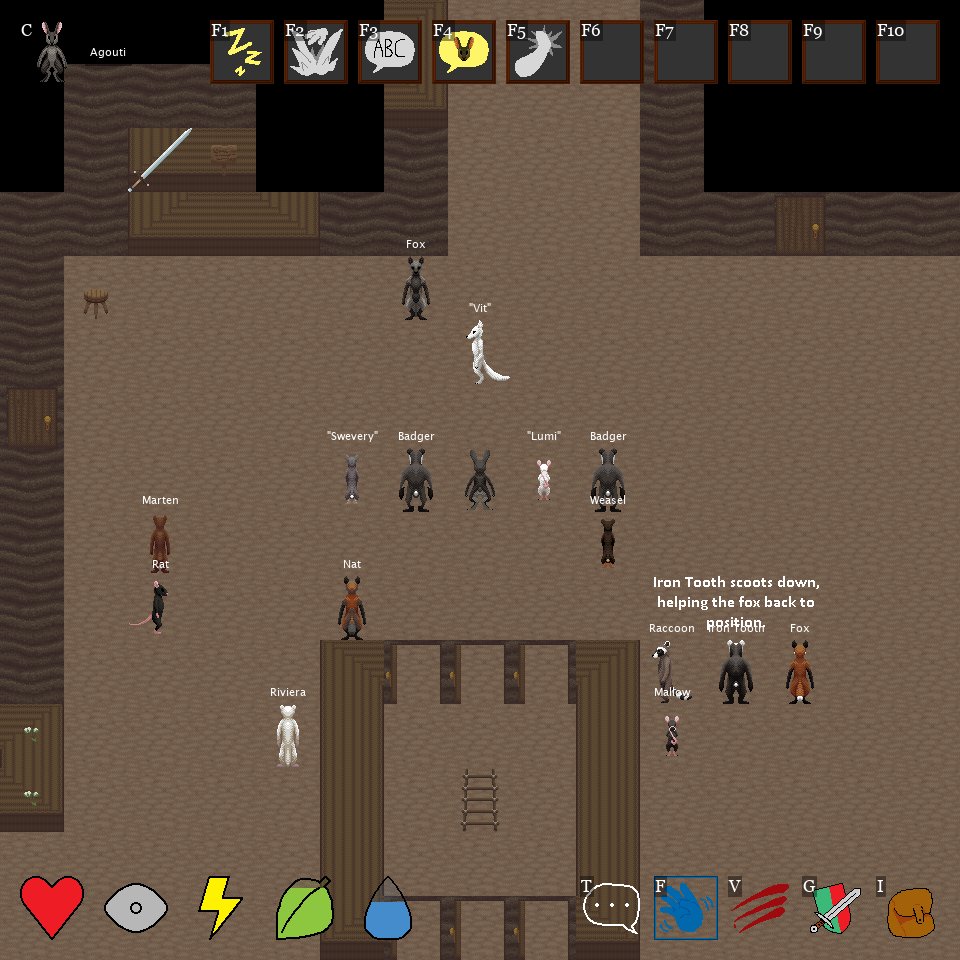
Now, critters no longer had their names shown by default. Instead, you would see their species, including in any messages related to them, until they physically told you their name. We set up a complicated regex query to catch any instance of people introducing themselves, while filtering out any regular conversation (e.g. "I'm between a rock and a hard place" would not introduce you to anyone if your character's name was Rock). Critters whose real names you didn't know could be manually nicknamed with whatever fake names you gave them. Thus, bandits could operate safely without purple mage intervention, unless they were foolish enough to give out their actual name to someone who would use it against them.
The Impersonation and Disguise skills were woven into this as well; if you disguised yourself and impersonated someone who had introduced themselves to the person you were speaking to, they would appear to have already been introduced, allowing you to masquerade as them and make a character even more likely to take for granted that you are who you say you are, since you show up as already introduced. Oh, and of course, if you introduced yourself as a false, impersonated name, it would show up as your true name, and be remembered when you impersonated them in the future, letting you maintain multiple false identities.
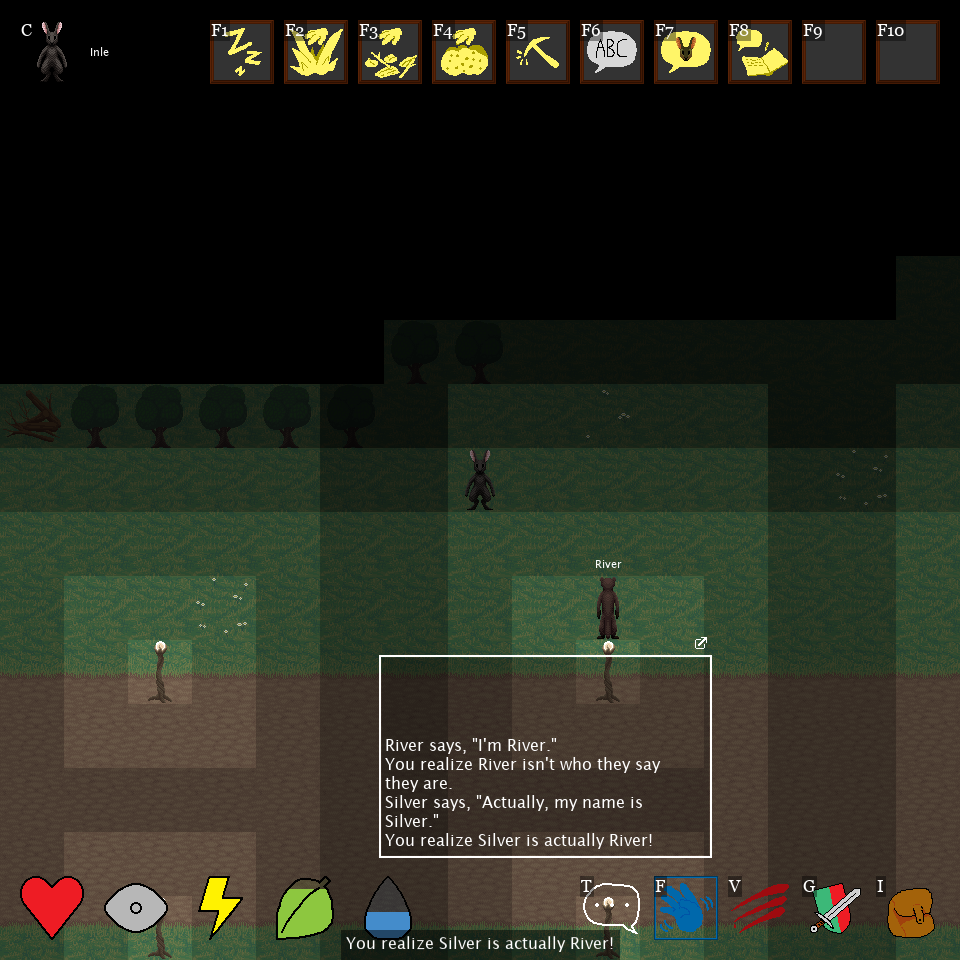
On the other hand, if a con artist introduced themselves to you as a pillar of the community and got you to give them something, and you later met the real person, you wouldn't recognize them until they told you, leading you to realize you'd been duped! Historically this kind of high-stakes impersonation has been some of the most fun and tense gameplay, so this was a great opportunity to intersect with new mechanics. There's all kinds of possibilities for capers and crimes there with a larger playerbase.
We also changed how the Cooking and Brewing skills worked. Before, you instantly produced whatever you made, like other crafting skills, so you only ever actually needed one baking pan, unless you ruined it with a critical failure. Now, using the crafting skills to cook and brew would set the items out to cook around the fire, and you'd find out if you succeeded once they finished; you also had to make sure they went undisturbed during the process, or else they'd be ruined!
This meant your ability to cook stuff at once was limited by the number of baking pans you had on hand, making them more valuable. Furthermore we added a new furniture item you can see in the video above: barrels, which could hold up to 40 cups worth of liquids, including water (now necessary for lots of recipes, so handy to have on hand in your kitchen) and teas and ciders for your tavern. In addition to being convenient storage, they were also nice decoration! Who doesn't appreciate a bar with a bunch of sturdy barrels behind the counter?
The Repair and Harden spells were also changed to take time to complete, to make repairing stuff a little more involved and time-consuming, and increase the chance of failure. And we added the Struggle skill, which could be learned to make it harder to loot you, a good way to spite bandits. Oh, and pickpocketing was expanded to include reverse-pickpocketing, letting you sneak items into people's inventories; this is a tool with a lot of fun potential applications.
But we weren't done there! With an influx of new people from the trailer and more on the horizon from Next Fest, a lot of skill books were running low in the Library, and it was difficult to replace them. This made things pretty tough on newbies, who couldn't learn the basics of skills like Scrounging which everyone wanted to keep for themselves. So we added a system of mentoring, whereby the first 15 levels in a skill could be taught to a player by someone who already knew it, for free.
We wanted to foster an actual teacher-student, apprenticeship relationship between characters who used this, rather than just experienced players dumping levels into newbies and seeing them off, so you were limited in how much you could learn per hour or two, to encourage long-term mentor relationships that involved roleplay as well as pure mechanics. This system worked really well and adds a lot to the game, especially combined with practicing. As we add depth to the skills, it also makes for a natural learning on-ramp to the game's various professions; you can learn the tricks of the trade from someone experienced with them, like a real apprentice.
June
Whew! Those keeping track at home may notice that May was a flurry of major content updates and balance overhauls. We considered ourselves to only have one shot to put our best foot forward for the Steam Next Fest audience, and wanted to get as much done as we could before people tried the demo. But we still had two weeks until it started, and one more big thing we wanted to get done before then...
At this point we had a pretty sizeable playerbase compared to what we had in January, which was devoted enough that they were playing nearly every day of the week. This was great, and very motivating, but it was also nightmarish from a development standpoint. We firmly believe that developers should play the games they make, but the more people were online, the more we were tempted to play, which cut into our development time, and also made it awkward to implement, test, and fix stuff ahead of our scheduled playtesting days, since people were almost always online and we didn't really want to disrupt their experience. This is a downside of having servers that are always up, though we think it's important to accommodate players from every timezone.
At last, we released another major update implementing one of the gaping holes left in the game's white paper: herbalism! We added the Herbalism, Pestling, Skullduggery, and Medicine skills as well as dozens of new herb items and their effects, with a very complicated and flexible system for gathering them, preparing them, and adding them to food and drink. It remains one of our favorite systems in the game; playing an alchemist is something that not anyone can just pick up by using the skill books. There's actual knowledge there to pass on between players, and it's very interesting and powerful.
With the addition of Pestling, dyes were moved into the skill, able to be created by mashing berries up with the new Mortar and Pestle item, created with stones by Forest Craft. Dyes were one of several regular items, along with flours and ground ingredients for use in cooking, that gave utility to Pestling beyond just its use in alchemy, so that people who took up the skill would be able to make a living off it. We also added the ability to mix dyes, to create a total of 23 different colors for expressing your individuality.
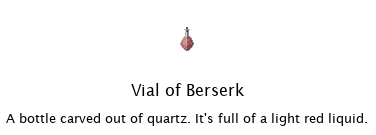
Uncut quartz could also now be turned by jewelers into Quartz Vials rather than crystals for mages. The primary use of these is potions; inside a vial, a liquid can be dyed, and labeled with Writing, allowing a savvy alchemist to produce scarlet-colored Vials of Restoration and create potion shops. This is also, in our humble opinion, a very cool feature. Plus, there's no way to tell what's actually in a liquid, so there's opportunities for charlatanry and snake oil! Why go to the effort of making real potions when you can sell fake ones?
With the addition of Herbalism as a Luck/Intelligence skill, we changed Mining to be Luck/Craft instead. We didn't really want miners to be incentivized to all also become herbalists because they shared the same stats. We also renamed Jewelry to Gemcutting, and Literacy to Writing, to better reflect what the skills actually did.
A few more items and traits were added, like sandwiches, and tabards for armor, but to us the most important of them were stamps. We added wooden wax stamps, which you could use with the new wax item, made with Cooking, to seal letters. And there were also Coin Stamps, made with iron by a smith, which could be used to mint coins. Both could be decorated with symbols including the faces of characters, and had several anti-counterfeiting measures to ensure they were actually worthwhile to use.
Stamped coins were huge; they meant that our players could actually establish currency-based economies, now, backed by the wealth of characters, and control the number of coins in circulation. Of course, you have to actually inspect the coins you receive to make sure they bear the right stamp, or else someone might be able to pawn off a fake on you... but this was a real turning point in unlocking a lot of character concepts and allowing characters to form durable economies and move away from bartering.
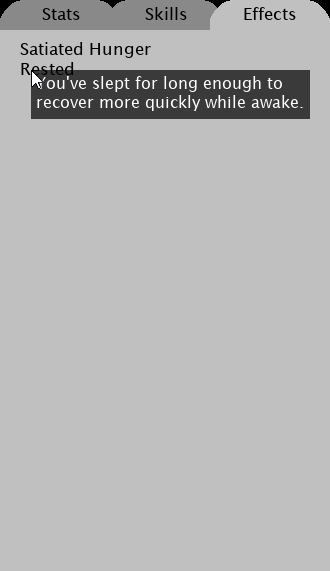
A lot of stuff changed behind the scenes, too. To accommodate the many, many new effects that were added by the new herbs, we refactored the server-side code to turn each effect into its own object-oriented class. This was a lot cleaner, more self-contained, and easier to maintain, though we had to wipe existing effects to do it. With this came an Effects tab in the character sheet so that people could keep track of the effects that were on them, a common request since the addition of the Rested effect.
We also tinkered with the line-of-sight code behind the scenes, optimizing it and making it more consistent. Before, it was possible to stand somewhere while hiding wherein you couldn't see someone, but they could see you, leading them to spot you without you having any idea you were visible. This was fairly frustrating, and is no longer an issue!
We also added the ability to lock furniture within 2 tiles of your burrow entrance, so that characters could light up their entrance with lampposts without fear of them being stolen. This also proved very useful for furniture we'd add later on.

The day before Next Fest we made some further last-minute changes, adding the Acorn Flour and Fieldflour pestling recipes to give more utility to Pestling and intertwine it with Cooking, which was kind of too easy before. We also added UI improvements to stamp stacks of coins (imagine stamping 200 coins one by one... eesh) and dye stacks of vials. We also added the ability to use vials on weapons, applying the effects on the next hit; this is primarily for poisons, but you can technically shoot healing arrows at people. We like emergent gameplay.
The day of Next Fest's launch, disaster struck. Our hosting provider was hit with instability, rendering the server inaccessible for long periods. It was totally out of our hands, and very annoying for something we'd been prepping for for months. Later on, we also discovered that we'd hit a tipping point for optimization in our server code, which was also causing people to be booted off the server in waves as it got busy trying to save the world to the database. A nightmare! It took us months to fix.
We also added sacks as a counterpart to barrels, since we had a lot of new powders added to the game and needed a more efficient way to store them in barrels. Then we took a break for a few weeks to wrangle the growing playerbase.
July
The first skill we added after Next Fest was an attempt to rebalance Mining. It was simply way too easy to generate tons of ore as a miner, which led to metals being fairly valueless. So, rather than giving you your mining rewards up-front as you mine, we started giving you Stone Chunks of varying sizes. The larger the chunk, the heavier it is, but also the more likely you are to get anything out of it.
In order to turn these chunks into something usable, we added the Stoneworking skill. This skill uses Intelligence (purely because Mining is Luck/Craft and we didn't want to make it too easy to do both, which would kinda defeat the purpose...) and allows you to do several things:
- Turn stone chunks into the Stone item, which no longer drops as part of Mining. All stone & stone items are made through the potential sacrifice of other rewards! Much like how making quartz vials requires sacrificing Uncut Quartz that might have contained a valuable Quartz Crystal.
- Make stone weapon heads. Wood Armorers can no longer make stone weapons by themselves! They need a stoneworker to help them.
- Make Mortars and Pestles. The Pestling skill came with Herbalism just before Next Fest launched, and in addition to being useful (though not required) for Medicine and Skullduggery, it was also required for a lot of Cooking recipes since you need to grind up ingredients for them.
- Last but certainly not least, firesetting. Firesetting is how you turn chunks into usable mining resources: metals, quartz crystals, gems, etc. Firesetting is sort of like cooking, but the chunks don't automatically "finish" after the time is up: instead, they are "fireset," start glowing, and require you to splash some water on them to crack them.
As previously mentioned, your chance to get anything out of a chunk depends on the chunk's size and your Stoneworking skill. The larger and heavier the chunk, the harder it is to transport, but the more likely you are to get something out of it. Even with maxed-out Stoneworking skill, you still won't get anything out of most chunks you set.
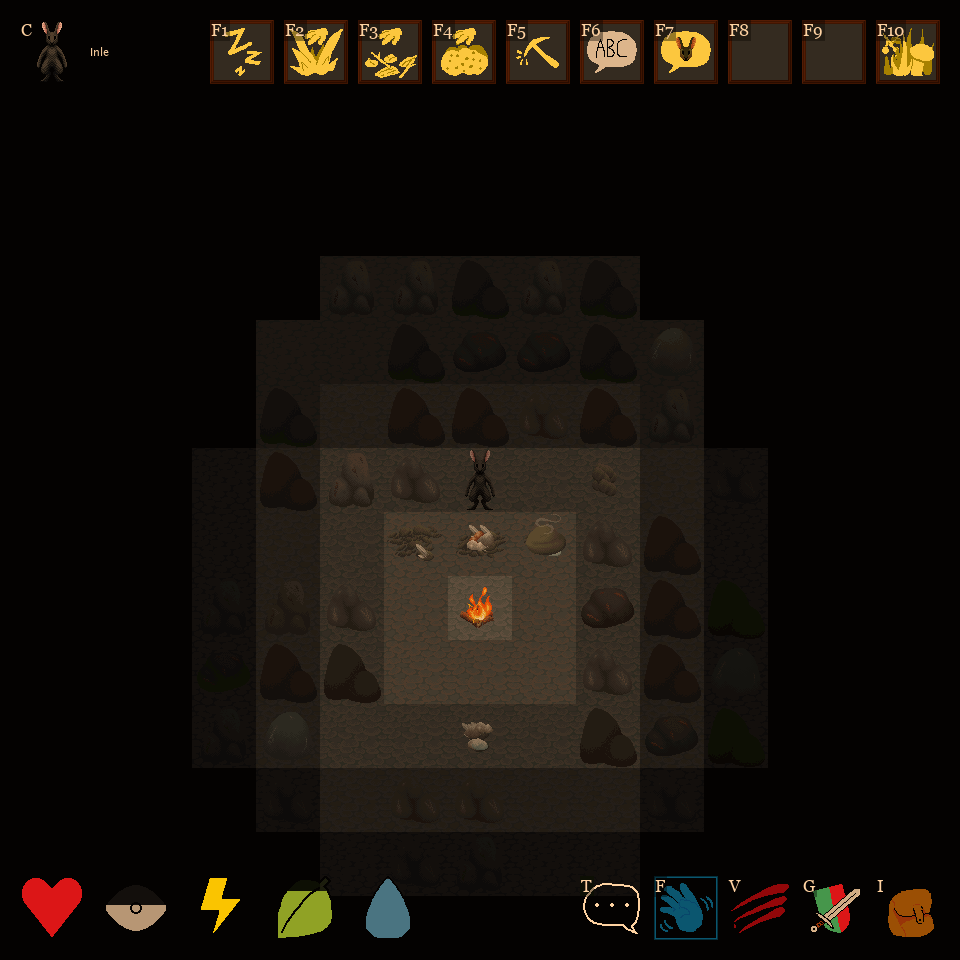
That's because our new philosophy for Mining was "more than you know what to do with." Mining generates tons of chunks of varying sizes, more than you can possibly carry by yourself. It then becomes a logistical puzzle figuring out how to get those chunks to a stoneworker so you can crack them. The more you cooperate, the easier this is. Cooperation is key in Farwoods! Smart miners will bring strong critters along with them to help them ferry the goods. Even more reason to hire a fighter to accompany you!
As you can see in the GIF above, we also replaced the Campfire item with Firestarting Kits. These kits are much cheaper to make than Campfires were, and once you light them you create a small fire which you can fuel by adding logs and bark. A "Campfire" has less than two hours left to burn; a "Cooking Fire" at least two hours.
Since all cooking recipes take two hours or less to cook, as long as you have a Cooking Fire going when you finish, you can rest assured that the fire won't go out before everything's done cooking (unless someone maliciously puts it out). This eliminated the fire babysitting for cooks and brewers that was a problem for a while. No more wasted food!
August
After all the hecticness of Next Fest and the large community that spawned out of it, we ended up burning out and taking August off, while working on the next update on and off. In fact, we took the server down for a few whole weeks, just so that we wouldn't have to worry about keeping an eye on it or missing out on anything. Mental health is important, folks; when you're developing a game you're in it for the long haul, so make sure you pace yourself.
September
This was a big one. A huge update that really fundamentally changed how people played the game, for better or worse. Previously, players had a "weight" limit expressed in our patented Forest Units which progressively slowed them down when they went over their carry weight. However, most people were still running around with very busy inventories. There was no issue going scrounging and coming back with ~200-300 berries in your inventory since they didn't weigh much.
It also made looting somewhat awkward for bandits: your chance of getting anything was low, and your chance of getting something valuable rather than a random scrounge item someone kept in their inventory, even lower. Primarily this update was to make banditry more viable (something we're still balancing), but we also wanted to add furniture containers.
Enter encumbrance! Where your maximum carry weight is based on your Strength, your maximum encumbrance is based on your Prowess and represents the total number of items you can carry in your inventory without being slowed down. This was a small number: 7-10 for most players.
But, we also added containers: bags, coinpurses, quivers, keyrings, chests, display cases, crates, jewelry boxes, mailboxes, delivery boxes, bookcases, and more. And later, parcels, packages, and folders for your paper and mail-related needs. Backpacks and rucksacks were also converted into containers, ones that you can wear, which is important for looting reasons because worn items are much lower-priority to select as loot.
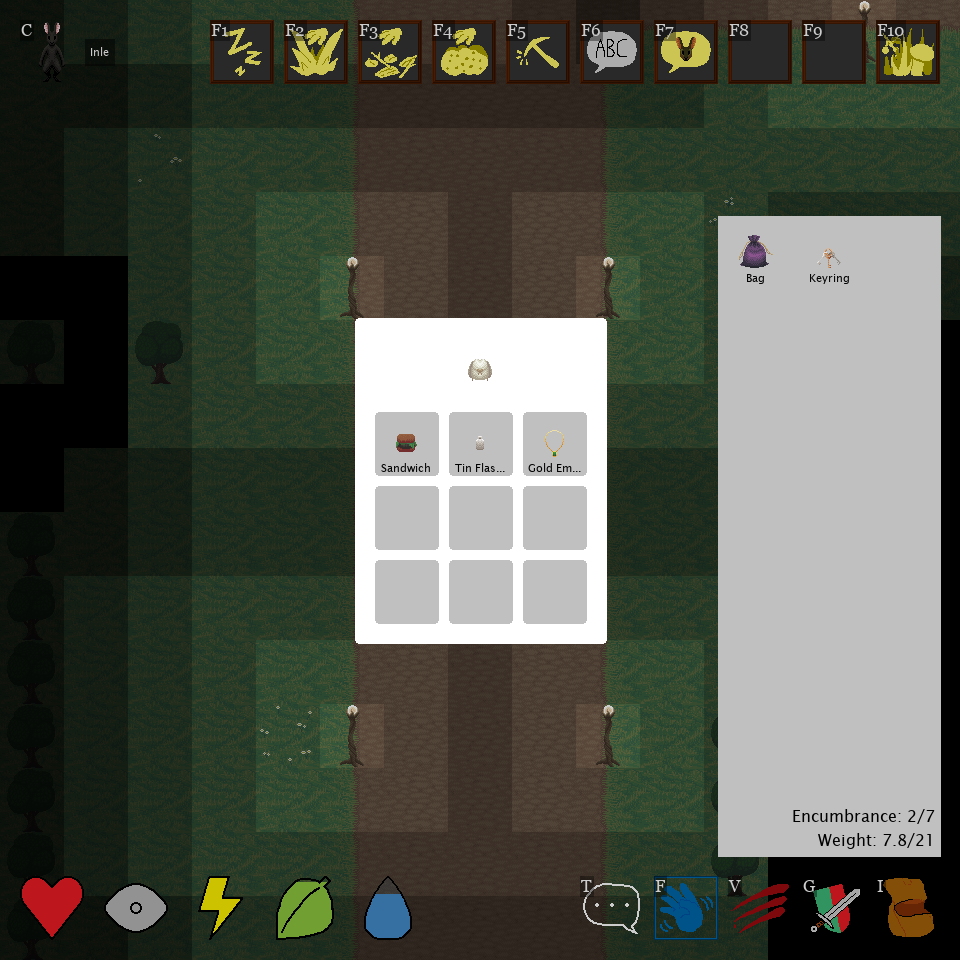
Items which are in containers in your inventory still add to your weight limit, but not your encumbrance limit. So if you wanna carry lots of stuff around, you now need to carry it in bags. Bags which are a single item in your inventory, and can therefore be looted, along with everything in them, by a bandit or pickpocket. Much easier to land a big score!
Containers can't be put in backpacks either, so if you use a keyring, that's vulnerable to looting. Coinpurses too. You can put keys and coins in your backpack for safer keeping if you want (can't be pickpocketed there), but that means you can't put other stuff in them, so if you're carrying around large stacks of items, you might be forced to remove them to make space since they don't stack.
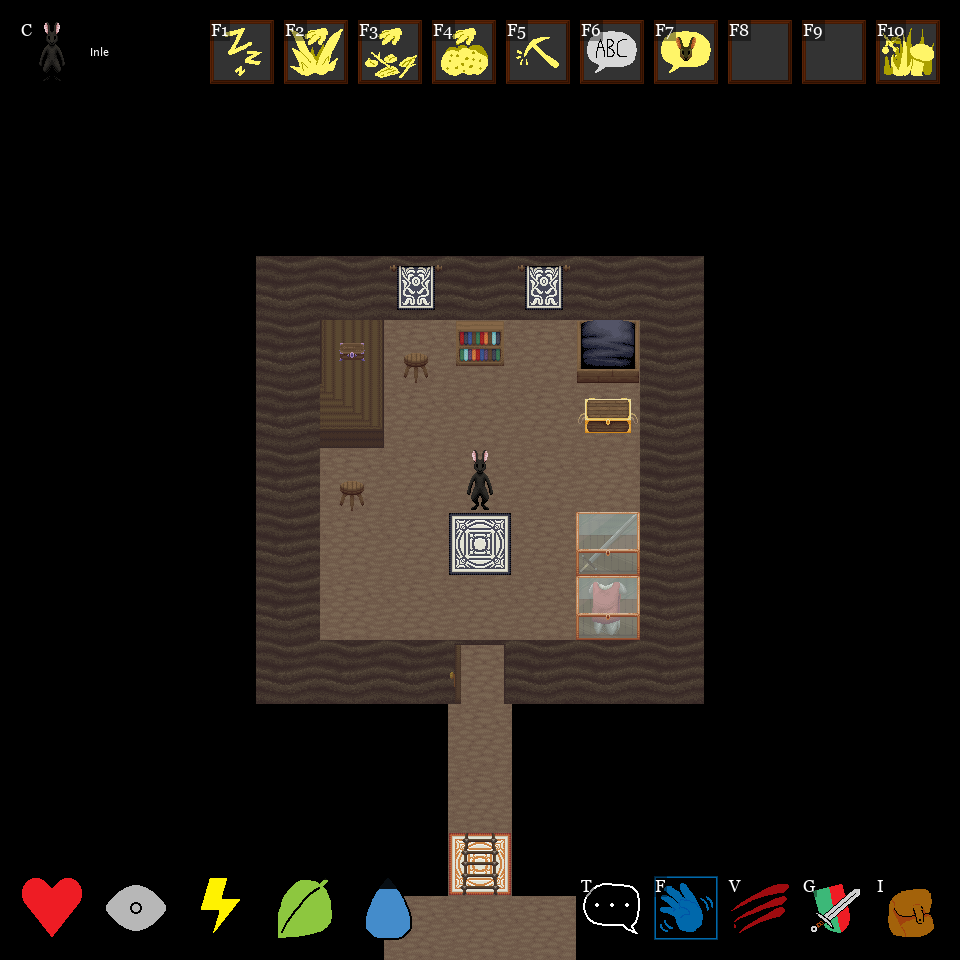
Furniture containers like chests, display cases, etc. addressed upcoming changes we intend to make to burrows. Chiefly, countertops are going to become both climbable and blinkable. "Closets" and "countertop displays" were popular metas for storing and displaying items safely, both free and certain in the knowledge that they couldn't be looted unless someone caught you opening them. This is a big problem from a balance point of view, since it makes it downright impossible to burgle a burrow, especially anything owned by the burrow owner since they don't need door keys to lock doors.
Enter furniture keys! A separate item from door keys, these are used to add locks to furniture containers like chests. All people with access to a locked container need a key, even the burrow owner. This combined with keyrings makes it far more likely that you might be able to lift some keys off someone and smash and grab their burrow before they can get to it.
At the same time, it also keeps stuff pretty secure: if no one with a key to your stuff is online, there's absolutely no way for the containers to be compromised. All burgling requires, at some point, interaction with a player linked to the burrow. You'll never have your stuff broken into just because you weren't there to watch it. As before, risk exposure to burglary increases with faction size. The more people who you give access to stuff for varying reasons, the more potential points of compromise there are for you getting robbed.

We were also excited to add mailboxes and delivery boxes for the purposes of encouraging messages in the game. Writing is a skill you need to have to write intelligible letters, so this was always kind of a niche thing. You can stamp papers with wax seals to turn them into letters, but why go to all the trouble if it's a pain in the tail to deliver them anyway?
Mailboxes are why. Put a mailbox up outside your burrow, and anyone who wants to leave a message for you can get it written and drop it off there to await the next time you log in. No longer do you need to catch people online or set up weird delivery systems in your burrow! They can store a lot of papers but nothing else; except later when we added parcels, which can contain both letters and coins. Pay for things by mail! Mail ordering! Shopkeeps no longer need to be around 24/7 if they have a catalog that you can submit payments for.
Delivery boxes work the same as mailboxes, but can store anything that can fit in a chest (to keep them from being used as chests, they have fewer spaces for items and are more expensive to make). This lets you drop stuff off. With the addition of packages, you can package up anything to make it fancy and even add a tag for gifts.
The asynchronous multiplayer aspect of mail really pleases us, not to mention it opens up economic possibilities. Want to make a character who's a postmaster? You could be the one who sets up and organizes the Kalrisian Postal Service! Pay people to deliver letters and packages, or get paid for it. Set up P.O. boxes in your burrow for characters that don't have burrows to rent. Rob mailmen on the road and steal valuable deliveries! It's a system that enriches the game a lot.
In addition to the usual balance tweaks and small content expansions (Caltrops and Slingshots, anyone?), we also added new skins for many species and sleeping sprites for every skin:
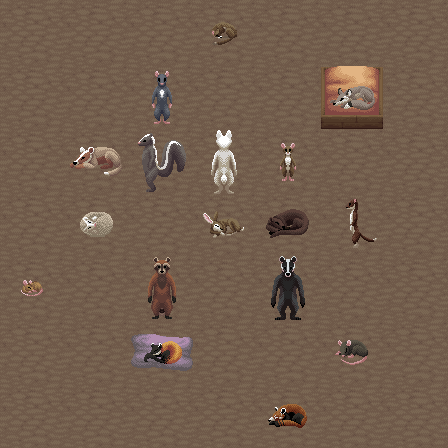
October
Obviously, our game is heavily inspired by Redwall, and feasting is a hugely important part of Redwall. We want it to be a big part of our game as well, so we took the time this month to add in 5 new scroungeable food items and 14 new cooking and brewing recipes using them (including some intermediary recipes). Here's a sneak peek of some of them from our Patreon:
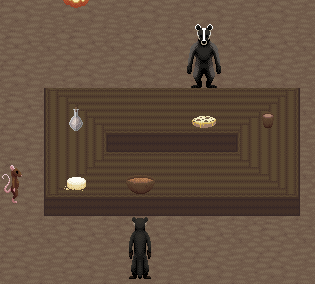
Flatbread, pizza, cheese, cookies, candy, and more... with the addition of woodnuts, petalnuts, greenstalks, ottertail, and seaweed. This is just the start; we intend to have a rich and diverse list of recipes that would make the Abbey jealous. We also added firemelons as a limited-time scrounging item for October and November, which you could make into firemelon lanterns and firemelon pie.
In the spirit of the season we threw together a special event for the month of October where the admins (Pica and Ethos) each created a ghost character with a special skin and their own plotline, and started interacting with players. We expanded on this as the month went on, since it was easy and cheap to spend development time on, until our ghosts:
- Didn't prominently display their race
- Were semi-transparent
- Couldn't be tracked
- Could blink silently
- Could disappear in plain sight
- Could enter locked burrows
- Could plunge burrows into darkness
and so on, and we set about stalking players according to the Ghost Rules™ we had decided on for our ghosts. Many spooks and frights ensued, as well as a few epic battles against the individual ghosts, and most people had a good time. At the end of our respective plotlines we rewarded people with rare items, including Ghost Lanterns which unlike the Firemelon Lanterns craftable at the time, didn't go away after October and don't give off any light.
November
Again, we took November off after a very involved and hectic September, recharging our batteries so that we could work on the new furniture and our planned content updates. Do what you gotta do to make sure you don't burn out!
December
At the beginning of the month we put out a small update that added a bunch of content, including new furniture items like dyed wax & candles, padded display cases, folders for storing papers, parcels, packages, string lights, glass-doored bookcases, firelamps, and cushioned stools.
Plus we added some other stuff like hats, and varying sizes of coins for currency. You can also now mount signs on walls, and dye rugs and tapestries two different tones. And we added thirteen new dye colors. 1,200+ possible combinations! You should have no trouble selecting a unique color scheme for any faction you might like to start, now.

The most up-to-date screenshot of the testing bedroom.
As you can see, this greatly improved the ability for players to decorate their burrows and make them look pretty! Compare to the screenshot in the Containers update and you'll see that this test room has come a long way.
With the decorations came a bunch of new lore books, detailing something that our patrons had voted on a few months back: the Imperial Pantheon, nine ancient dragons that were worshiped by the late Kalrisian Empire. Here's an overview of the pantheon
Il-Tira: the "mother dragon," goddess of fate, prophecy, magic, etc.
Morothi: god of the night, survival, solitude, outlaws, theater, poetry, parley
Silvanus: goddess of the snow, winter, bitterness, jealousy, restlessness, cloth and tailoring, endurance
Dharasi: god of the sun, sand, fire, iron, industry, etc.
Althas: god of the sea, weather, waves, lightning, anger, mercy, guilt
Jyra-Tul: god of death, law, order, balance, wisdom, government, justice, vengeance, music
Cerridwen: goddess of the forests, harvest, bounty, wilderness, woodworking, scrounging, beasts, marriage, friendliness
Elyenne: goddess of the moon, stars, travelers, messengers, mercantilism, commerce, knowledge, research, study, the Common language
Velyra: goddess of love, pleasure, beauty, food, hospitality, new friends, merriment, cooking, truth
Finally, at the end of the year, we implemented a long-overdue overhaul for the Scrounging and Herbalism mechanics. Previously scroungers would just go to the "best spots" in an area and sit there spamming the Scrounging skill to fill themselves up on resources, tabbing out for a few minutes whenever they ran out of Mind until it regenerated. This is pretty tedious, and it doesn't exactly encourage use of the entire map. It's boring grinding and even worse, it meant you could scrounge right outside your burrow and duck back inside to safely store anything you got.
No longer! Now, rather than pulling from a scrounging table based on the tile you're sitting on, the server generates scrounging spots and scatters them across the map based on the table for a given tile. This means that in order to scrounge, you have to actually be next to a scrounging spot. However, scrounging spots are not normally visible; you reveal them through scrounging.
You don't need to be able to see a spot to scrounge from it, so characters with high Scrounging can guide characters with low Scrounging along to scrounge from the spots they find, and players can trade tips on good scrounging spots, since they stick around for a while. You're also gently limited in how far you can reveal scrounging spots by your Perception, to try and make it a bit less of a dump stat. Since you have to move around while scrounging a lot now, too, carrying a bunch of weight is more of an issue.
However, spots which have been gathered from also expire faster than those that are untouched, and every time a spot expires, a new one is placed. This means that, over the long term, areas which don't see a lot of scrounger traffic will have more stuff in them than those that do. This combination should reward people for exploring the map, and ensure that every part of a zone is worth checking out, not just the ones that have the best chance of spawning stuff you want on paper.
Low-skilled scroungers, and ones with low Perception, can take advantage of a new action called Passive Scrounging, which uses Mind as you walk around to attempt to reveal adjacent scrounging spots, even if you wouldn't normally be able to reveal them. This is less efficient than using the actual scrounging action to reveal things, so characters that can do that probably won't use passive scrounging. The system has been really well-received so far; it's a lot more fun!
Oh yes, and of course, we had a Rhiannovas celebration with lots of gifts.
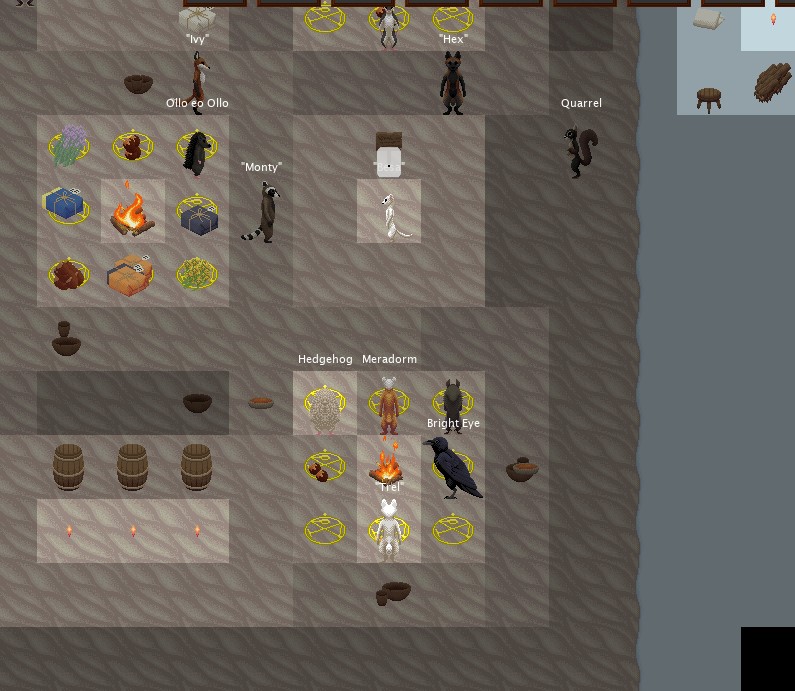
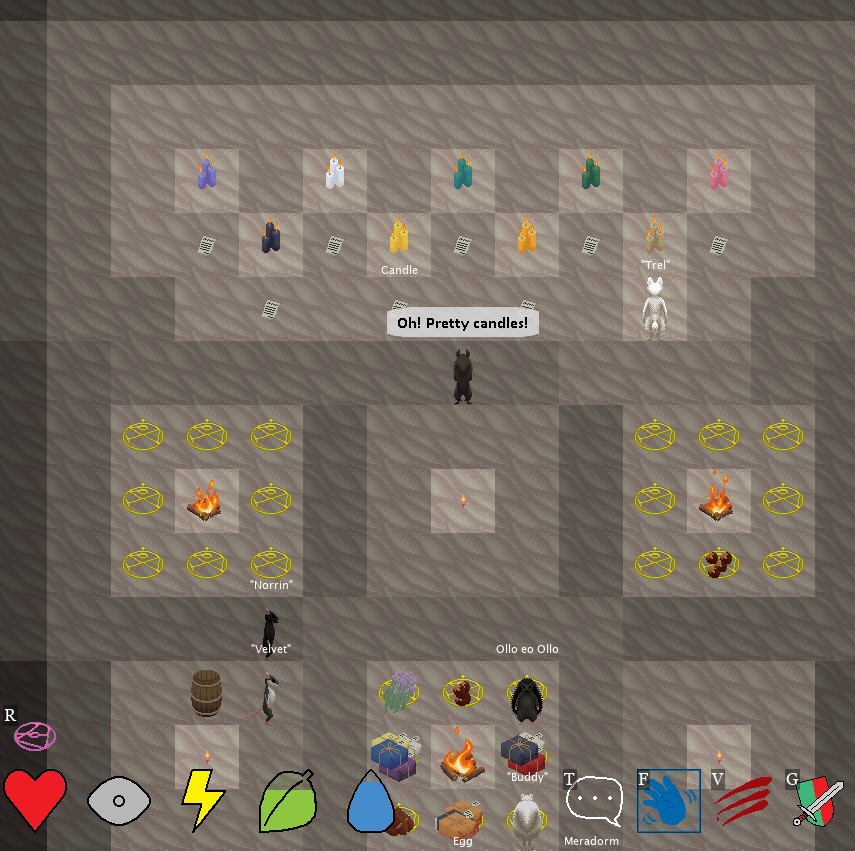
2023
So what's left on the to-do list for next year? Oh, man... so much. Three entire skills remain unimplemented: Gardening, Arcanism, and Archaeology, both of which will bring a ton of new content and gameplay loops.
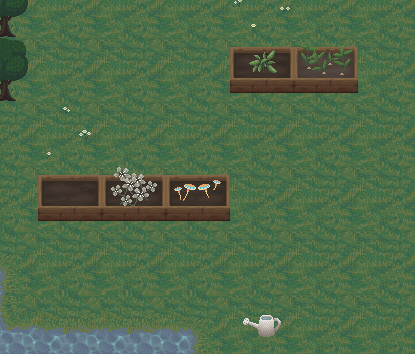
On top of that, we intend to overhaul several of our systems: the scrounging overhaul just got finished, and next on the list are tracking and smithing, two systems in dire need of rebalancing and fleshing out. We absolutely can't wait to get those done! We also want to overhaul our green and red magic schools, both of which are pretty underwhelming and boring for mages, no matter how powerful they are.
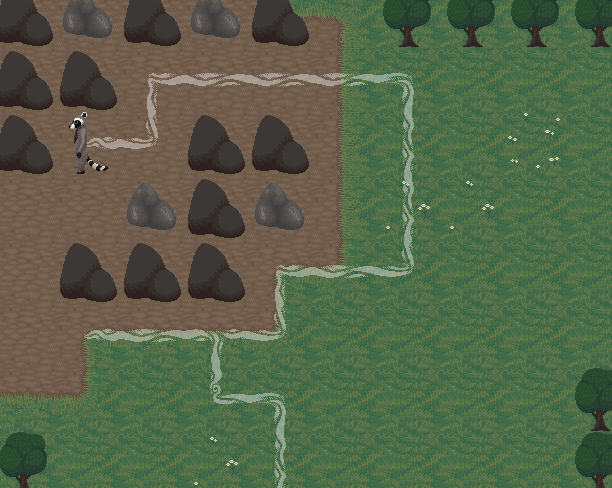
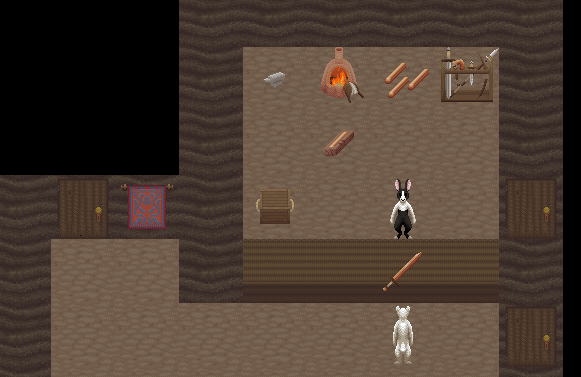
We intend to put out a new trailer soon, giving a more accurate impression of what the game is like now. And we have a UI overhaul on the horizon as well, among other improvements to the new player experience, and we want to expand our website and better integrate it into the game. And of course, a lot more furniture and decorations.
Those of you who read this far (or skipped to the end): You can play the open alpha FOR FREE, RIGHT NOW! Check it out on our website: https://farwoods.net/ or download it from our Itch.io page!
And consider joining our Discord: https://discord.gg/kcStdHHuE6
Get Farwoods
Farwoods
Storybook fantasy RPG in an immersive online world
| Status | In development |
| Author | Chanterelle Interactive |
| Genre | Role Playing |
| Tags | 2D, Fantasy, gmud, MMORPG, mud, Multiplayer, Pixel Art, Sprites, Story Rich |
| Languages | English |
More posts
- Gardening UpdateJan 02, 2024
- Fancy some dice?May 26, 2023
- Furniture & Mail UpdateDec 14, 2022
- Banditry & InventorySep 26, 2022
- Containers UpdateSep 22, 2022
- Cooking Update & Gameplay OverhaulsMay 31, 2022
- Trailer released on YouTubeMay 20, 2022
- Furniture & Dyeing UpdateMay 19, 2022
- Language system & traitsOct 06, 2021
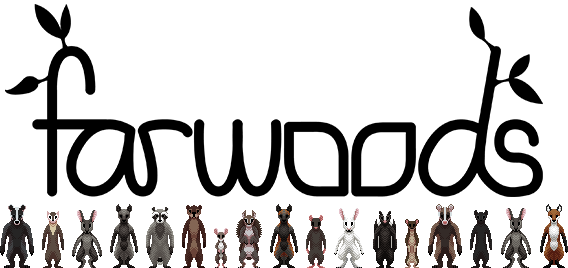
Leave a comment
Log in with itch.io to leave a comment.